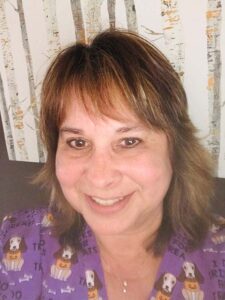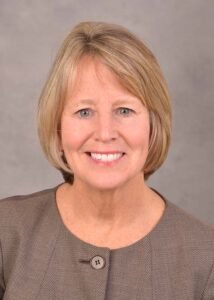Nurses play a vital role in patient care
By Deborah Jeanne Sergeant
In a field fraught with burnout — particularly in the past two years — enduring in healthcare for decades represents an important accomplishment worthy of recognition.
Along the way, long-term nurses learn a lot about the healthcare industry and the skills hard to teach in a classroom.
One of these is Linda McAleer, deputy director of nursing for Upstate Golisano Children’s Hospital and 45-year veteran nurse.

McAleer is a board-certified nurse executive and bachelor’s-trained registered nurse. The example of her mother drew her to the vocation.
At age 18, McAleer attended what is now St. Elizabeth’s College of Nursing and graduated in 1977. She wanted to work in pediatrics.
However, she was required to work as a surgical nurse for six months first, a hands-on experience she does not regret.
“It helps you become a better, more well-rounded nurse,” she said.
She was able to shift to pediatrics and returned to St. Elizabeth’s to earn her bachelor’s degree at what was then SUNY College of Technology so she could expand her future opportunities.
“At the time, I didn’t know what those opportunities were, but I loved learning and expanding my role,” she said.
Little did she know at the time that would lead to positions such as public health nurse for Onondaga County, working at a clinic at Onondaga Nation, providing genetic counseling at an out-patient clinic, and now director of nursing at Golisano.
To grow into that role, she earned her master’s degree in 15 months.
“I have loved my job,” she said. “It’s so incredible to come to work every day and be surrounded by a great team of caring people with the fabulous mission we have. It’s been very challenging with a lot of growth opportunity.”

Over her impressively long tenure, McAleer has seen the biggest change in the need for behavioral healthcare for adolescents and children. The shift required adding more resources and education for nurses to better take care of this population.
The pandemic “changed everything,” she said. “The past two years have been challenging in a way I could never imagine. The first year was extremely difficult as everything had to shut down to care for COVID-positive patients. That meant a lot of pediatric nurses getting floated to adult units. Kids weren’t affected like adults.”
In addition, turnover increased. One reason is the lure of traveling nursing paying much higher rates than the salaries to which nurses are accustomed.
“We had turnover like we’d never seen in pediatrics and now we’re in a rebuilding mode,” McAleer said.
Serving families and patients is what she has liked best about nursing.
“We get to interact with them in the most vulnerable part of their lives,” she said. “We try to support them and be there for them in the best way we can. It’s an honor and a privilege.”
She has also enjoyed mentoring and coaching new leaders in nursing “so staff can do their job to the fullest degree,” McAleer added. “This work is very hard. It’s part of resiliency. You must find ways to be creative and help bring some of that resilience into your team.”
Another long-term nurse is Angela Schimpff, RN, a home care nurse with Oswego Health who has been in nursing more than 25 years and in healthcare since the 1980s. Healthcare has become “a lot more intricate” since then, she said. When she began nursing as a newly minted LPN in the early 1990s after graduating from BOCES in Mexico, patients typically received care from a general practitioner who handled most of their healthcare needs and seldom were referred to specialists.
“Most people have three to five doctors,” Schimpff said. “It’s not one point person. It’s a challenge for patients and it certainly is a challenge for nurses, especially in home care.”
Schimpff began working in healthcare as a home health aide for Oswego Health in the 1980s, but soon realized that she wanted to do more for patients, which led to her eventually earning the registered nurse credential in 2010 by completing the program at Cayuga Community College and passing her exam.
“The medical realm is a hard system to navigate,” Schimpff said. “I like to help people navigate through that system. They don’t know what community resources are available. I like to be that voice for people who don’t have one.”
As a case manager, she coordinated patient care and refers to disciplines like physical therapy, occupational therapy and speech therapy. Schimpff decided that she preferred working directly with patients and returned to that role in homecare, offering wound care and assessments, acting as a liaison to the doctor and updating the plan of care.
“We’re their ears and eyes in the community,” Schimpff said.
While many people assume that “home care” means older adults or persons with disabilities, Schimpff said that home care includes all sorts of populations with needs better served at home.
During the last two years, COVID-19 has made much of her work more difficult, as with all healthcare providers.
“It’s been hard making a personal connection with someone in their home,” Schimpff said. “Usually, when we’re in their house, it’s not like in a hospital. We get to know their grandkids, dog, cats, their favorite food.”
Wearing goggles, masks and gowns for every patient visit has increased difficulty in making those patient connections, which Schimpff said help for the basis of trust.
The pandemic has also worsened the nationwide staffing shortage.
Schimpff has observed the issue for her entire career. She believes that programs such as BOCES’ New Vision allows high school students to see different parts of the medical community and can help engage them in exploring where they could fit.
“We need more programs like that,” Schimpff said. “I think there should be more staff retention. We work so hard on recruiting but do not pay as much attention to keeping the people we have. There are more bonuses to get staff to come work for you but you need to focus on those you have.”
Despite the challenges that the healthcare industry faces and the day-to-day struggles of nursing, Schimpff has no regrets for her career choice. She tells new nurses, “Even when times get tough for nurses, if you’re helping someone, it’s worth it. We may have a crazy day but at the end of the week, we know we made a difference. I know I can make a difference in someone’s health and home life.”

